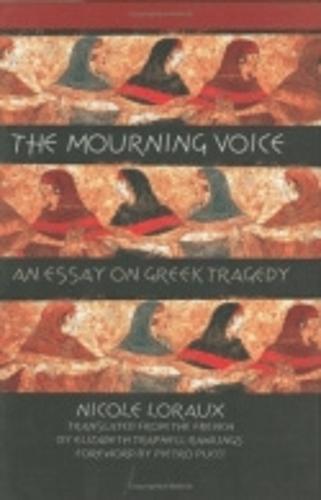Overview
In The Mourning Voice, Nicole Loraux presents a radical challenge to what has become the dominant view of tragedy in recent years: that tragedy is primarily a civic phenomenon, infused with Athenian political ideology, which envisions its spectators first and foremost as citizens, members of the political collective. Instead, Loraux maintains, the spectator addressed by tragedy is the individual defined primarily in terms of his or her humanity, rather than in terms of affiliation with a political group. The plays, she says, involve the spectators in the emotional expressiveness of tragic suffering, thereby creating a theatrical identity. Aroused by the experience of suffering, the audience is reminded that it is witnessing a theatrical representation of the instability of the human condition-a state that Loraux asserts tragedy is uniquely suited to convey.
Full Product Details
Author: Nicole Loraux ,
Elizabeth Trapnell Rawlings ,
Pietro Pucci
Publisher: Cornell University Press
Imprint: Cornell University Press
Dimensions:
Width: 15.20cm
, Height: 1.90cm
, Length: 22.90cm
Weight: 0.454kg
ISBN: 9780801438301
ISBN 10: 0801438306
Pages: 277
Publication Date: 15 May 2002
Audience:
College/higher education
,
Professional and scholarly
,
Undergraduate
,
Postgraduate, Research & Scholarly
Format: Hardback
Publisher's Status: Active
Availability: To order

Stock availability from the supplier is unknown. We will order it for you and ship this item to you once it is received by us.
Language: English
Reviews
Nicole Loraux's work throughout her career has been bold, original, and provocative. The subtlety of her thought and depth of knowledge established new standards for the interpretation of political and social institutions in fifth-century Athens that have since become indispensable for our understanding of ancient Greece. In this new book, she turns away from the body politic to focus on the central role of lamentation in tragedy. Once again, with characteristic energy, Loraux challenges deeply cherished notions and compels us to read Aeschylus, Sophocles, and Euripides in fresh ways. -Froma Zeitlin, Princeton University
In her many publications, the author has never ceased to provide new and exciting perspectives on Greek culture. Although one many not agree with every detail of her findings in the present book, the work is nonetheless a stimulating contribution to our understanding of Greek tragedy. -Jennifer Clarke Kosak, Bowdoin College, The Classical Bulletin, 2003 Nicole Loraux's work throughout her career has been bold, original, and provocative. The subtlety of her thought and depth of knowledge established new standards for the interpretation of political and social institutions in fifth-century Athens that have since become indispensable for our understanding of ancient Greece. In this new book, she turns away from the body politic to focus on the central role of lamentation in tragedy. Once again, with characteristic energy, Loraux challenges deeply cherished notions and compels us to read Aeschylus, Sophocles, and Euripides in fresh ways. -Froma Zeitlin, Princeton University
Author Information
Elizabeth Trapnell Rawlings is an independent translator of books including The Mind of Thucydides by Jacqueline de Romilly, The Care of the Dead in Late Antiquity by Eric Rebillard and The Mourning Voice by Nicole Loraux, all from Cornell. Pietro Pucci is Goldwin Smith Professor of Classics Emeritus at Cornell University. He is the author of several books, including Odysseus Polutropos: Intertexual Readings in the ""Odyssey"" and the ""Iliad,"" The Violence of Pity in Euripides' ""Medea,"" and Oedipus and the Fabrication of the Father: ""Oedipus Tyrannus"" in Modern Criticism and Philosophy.



